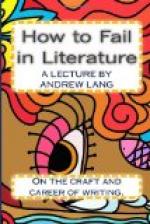In the matter of style, there is another excellent way. You need not neglect it, but you may study it wrongly. You may be affectedly self-conscious, you may imitate the ingenious persons who carefully avoid the natural word, the spontaneous phrase, and employ some other set of terms which can hardly be construed. You may use, like a young essayist whom I have lovingly observed, a proportion of eighty adjectives to every sixty-five other words of all denominations. You may hunt for odd words, and thrust them into the wrong places, as where you say that a man’s nose is “beetling,” that the sun sank in “a cauldron of daffodil chaos,” and the like. {2} You may use common words in an unwonted sense, keeping some private interpretation clearly before you. Thus you may speak, if you like to write partly in the tongue of Hellas, about “assimilating the ethos” of a work of art, and so write that people shall think of the processes of digestion. You may speak of “exhausting the beauty” of a landscape, and, somehow, convey the notion of sucking an orange dry. Or you may wildly mix your metaphors, as when a critic accuses Mr. Browning of “giving the irridescence of the poetic afflatus,” as if the poetic afflatus were blown through a pipe, into soap, and produced soap bubbles. This is a more troublesome method than the mere picking up of every newspaper commonplace that floats into your mind, but it is equally certain to lead—where you want to go. By combining the two fashions a great deal may be done. Thus you want to describe a fire at sea, and you say, “the devouring element lapped the quivering spars, the mast, and the sea-shouldering keel of the doomed Mary Jane in one coruscating catastrophe. The sea deeps were incarnadined to an alarming extent by the flames, and to escape from such many plunged headlong in their watery bier.”
As a rule, authors who would fail stick to one bad sort of writing; either to the newspaper commonplace, or to the out of the way and inappropriate epithets, or to the common word with a twist on it. But there are examples of the combined method, as when we call the trees round a man’s house his “domestic boscage.” This combination is difficult, but perfect for its purpose. You cannot write worse than “such.” To attain perfection the young aspirant should confine his reading to the newspapers (carefully selecting his newspapers, for many of them will not help him to write ill) and to those modern authors who are most praised for their style by the people who know least about the matter. Words like “fictional” and “fictive” are distinctly to be recommended, and there are epithets such as “weird,” “strange,” “wild,” “intimate,” and the rest, which blend pleasantly with “all the time” for “always”; “back of” for “behind”; “belong with” for “belong to”; “live like I do” for “as I do.” The authors who combine those charms are rare, but we can strive to be among them.




